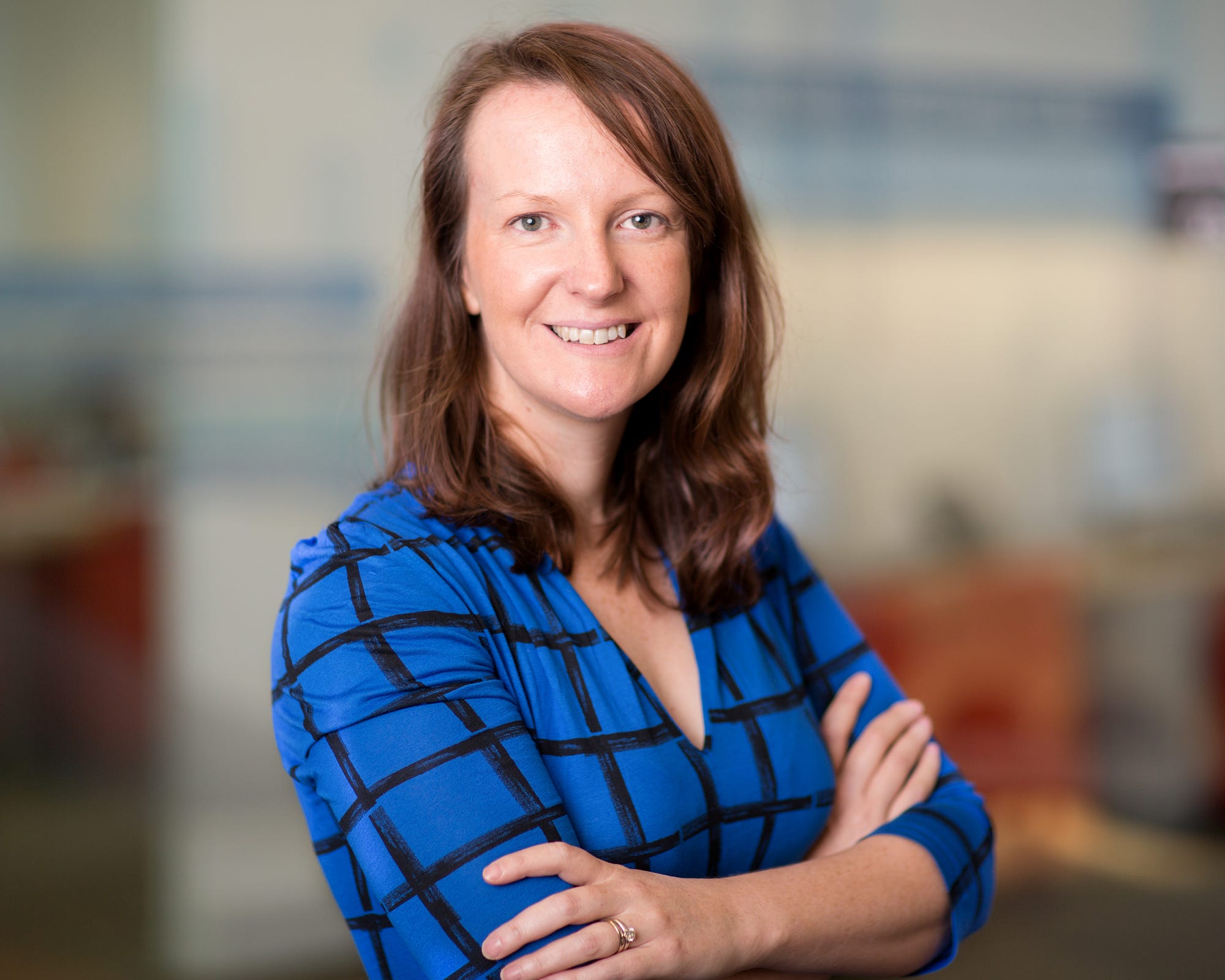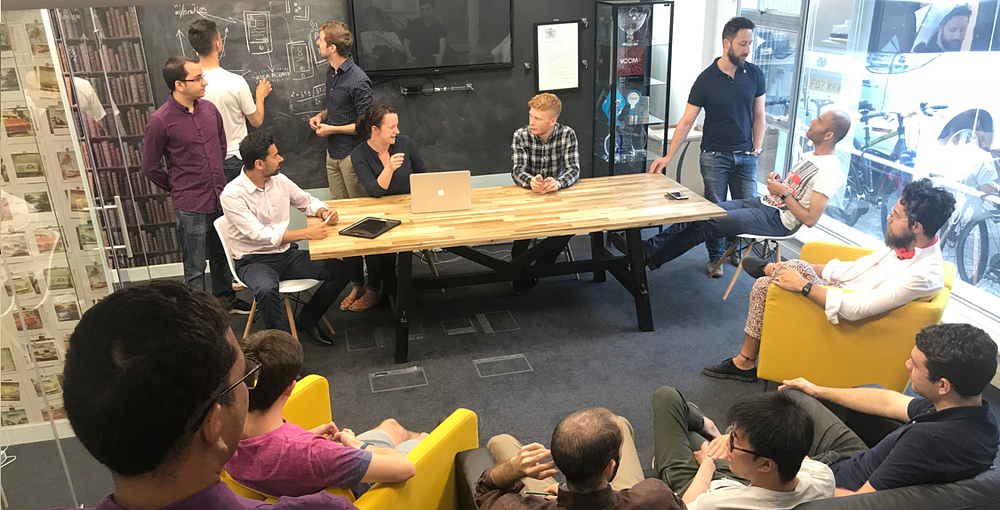
We are really passionate about this project. Adults with DLD are twice as likely to be unemployed at 30 and more likely to be in the justice system. Evidence shows that early intervention not just helps the individual but also saves the country time and money later on. I think every child entering school should be assessed, so if they need help, those resources can be allocated at 4 or 5.
As a part of our series of profiles about “Bleeding edge” technological breakthroughs that seem copied from science fiction, I had the pleasure of interviewing Rebecca Bright MBE. Rebecca is a speech therapist who has developed numerous award winning apps, all which help people with speech and language difficulties.
Thank you so much for doing this with us! Can you tell us a story about what brought you to this specific career path?
In my work as a speech therapist I specialised in working with young adults with neurological conditions. One young lady had lost the ability to use her voice. To communicate, she typed her messages on the screen of her phone and showed it to people. I thought I could solve her problems and took in the smallest communication aid device on the market at the time. It was on a PalmPilot, and the lady took one look at it, picked up her phone and typed “F*** off”. In no uncertain terms, this technology was not going to work for her. I realised there had to be a better way and started work on designing our first app for the iPhone for people like my patient. That is how Predictable came about in 2011.
Can you share the most interesting story that happened to you since you began your career?
To my complete surprise, and joy, in 2016 I received a letter to say I was going to be given an MBE by the Queen in the New Years Honours. This was a complete shock. One of the things about getting an MBE or any other honour, is that you don’t know who nominated you. It was lovely to be able to go to Buckingham Palace to receive the honour.
Can you tell us about the “Bleeding edge” technological breakthroughs that you are working on? How do you think that will help people?
This year we have been working on our most ambitious project yet. We are working on using children’s audio in retelling a story to help identify whether they have developmental language disabilities (DLD). DLD is a real issue for 2 children in every classroom of 30. It’s really important that DLD is detected early enough so that children can receive support early enough. If the right support is not received, difficulties can persist which negatively impact their life at school and later on.
How do you think this might change the world?
We are really passionate about this project. Adults with DLD are twice as likely to be unemployed at 30 and more likely to be in the justice system. Evidence shows that early intervention not just helps the individual but also saves the country time and money later on.
I think every child entering school should be assessed, so if they need help, those resources can be allocated at 4 or 5.
Keeping “Black Mirror” in mind can you see any potential drawbacks about this technology that people should think more deeply about?
One of the drawbacks of any machine learning technology is that larger healthcare systems can be skeptical. When there is a black box approach to machine learning, it can be disconcerting to just have a diagnosis from a machine — for clinicians and for patients. We are trying to balance that out by sharing with users how the decision making happens for other features and variables.

Was there a “tipping point” that led you to this breakthrough? Can you tell us that story?
My sister Erin works with a charity in Australia that works a lot with people who have been through the justice system. We were talking about how many of these people had communication disabilities, and how early intervention is so key to making a difference.
After doing some research I was surprised that no one was using machine learning to help identify the kids that needed support. This became our big challenge for 2018!
What do you need to lead this technology to widespread adoption?
We need people to think proactively. To understand that focussing on early detection and intervention makes sense for the economy. Idealistically it would make a difference to us all. This means that healthcare providers and public health would understand that having a population wide screening programme using our software could be an equaliser.
What have you been doing to publicize this idea? Have you been using any innovative marketing strategies?
We won the Voom award in May. Part of our prize is from JCDecaux, so we will be utilising some outdoor billboards to publicise our big citizen science project. As part of our campaign we will be launching a storytelling app that encourages children to record themselves telling a story. This important data will help our algorithms learn more about how children around the UK talk. As with any machine learning project, data is essential. So, hopefully a big billboard will help people to know about our app!
None of us are able to achieve success without some help along the way. Is there a particular person who you are grateful towards who helped get you to where you are? Can you share a story about that?
We are very lucky to work with academics at universities across the UK, who bring their expertise and years of research to our projects.
How have you used your success to bring goodness to the world?
I think we have used our success to bring goodness to the world. Our app Predictable is now in 10 languages and is used around the world by people with motor neurone disease/ALS, cerebral palsy and throat cancer. People tell us that our app makes their life much better!
What are your “5 Things I Wish Someone Told Me Before I Started” and why. (Please share a story or example for each.)
1. Customer complaints are really useful. Our app Predictable is used by people with pretty serious disabilities and they rely on the app to communicate, so if something goes wrong or isn’t working well they often get in touch. At first, these complaints were difficult to hear, but now we are grateful of the insights they provide. Complaints make a product better.
2. Hire people who are experts in their domain. It’s really easy to try and do everything yourself. This is definitely the case in a small business or a startup. Learning to hire (and being able to afford to hire) people with expertise in their area is so important. It will save you money in the long-run, and give you time to focus on your business.
3. Running your own business is no picnic. While your may have more flexibility in your day and are able to set the priorities, running your own business means you work longer hours and its much harder to switch off.
4. Go and ask your customers what they really think about your apps — People with disabilities and their families are incredibly generous with their time and thoughts about our apps. Even those who are in the last few months of their lives will still suggest updates, explaining that it won’t help them, but will be great for whoever comes along after they’ve gone.
5. In fact, not being able to code might be a good thing — I thought a clinical background might be a drawback in the technology sector. But I think a clinical background sets you up well for going into business. A lot of what you do as a clinician is trying to understand people. You need to have empathy for someone’s situation and help them try to solve problems. I suppose that skill set works for the technology as well because that is what we do on a day to day basis.
You are a person of great influence. If you could inspire a movement that would bring the most amount of good to the most amount of people, what would that be? You never know what your idea can trigger. 🙂
I would like businesses to truly be accessible and inclusive, not just use it as a badge. For many of my patients and the people who our business works with, their disabilities are invisible. So a wheelchair ramp might be a visible way for companies to be accessible, but what about ways they can be accessible for people who cannot speak, or who have trouble reading or using language? I would like companies to be creative and find clever ways to make sure people can interact with their business in a very multi-modal way.
Can you please give us your favorite “Life Lesson Quote”? Can you share how that was relevant to you in your life?
“One of the advantages of being disorderly is that one is constantly making exciting discoveries”, said AA Milne.
This is very true. I think that keeping to the rules might be safer but we have found that pushing the boundaries and working past preconceptions has resulted in some of our big successes Change in the NHS can be a challenge and some people were sceptical about using mobile technology in this way, thinking that children might just play games with it or, because of their condition, be unable to handle a hand-held device.”
Fortunately, patients and families praised its versatility and cost. The NHS was then being asked to save money, so it was difficult to ignore that we were selling a £110 app that was effectively going to replace something that cost up to £8,000.”
Some very well known VCs read this column. If you had 60 seconds to make a pitch to a VC, what would you say? He or she might just see this if we tag them 🙂
Therapy Box is an award winning company applying its technical and clinical expertise to create machine learning based tools which help people with communication disabilities. Saving health services time and money, the tools leverage the team’s technical expertise in speech, linguistics and acoustics with algorithms to make it quicker to type for people with ALS through to clinical decision support for clinicians working with children with language disorders.
How can our readers follow you on social media?
@therapybox
Thank you so much for joining us. This was very inspirational.



